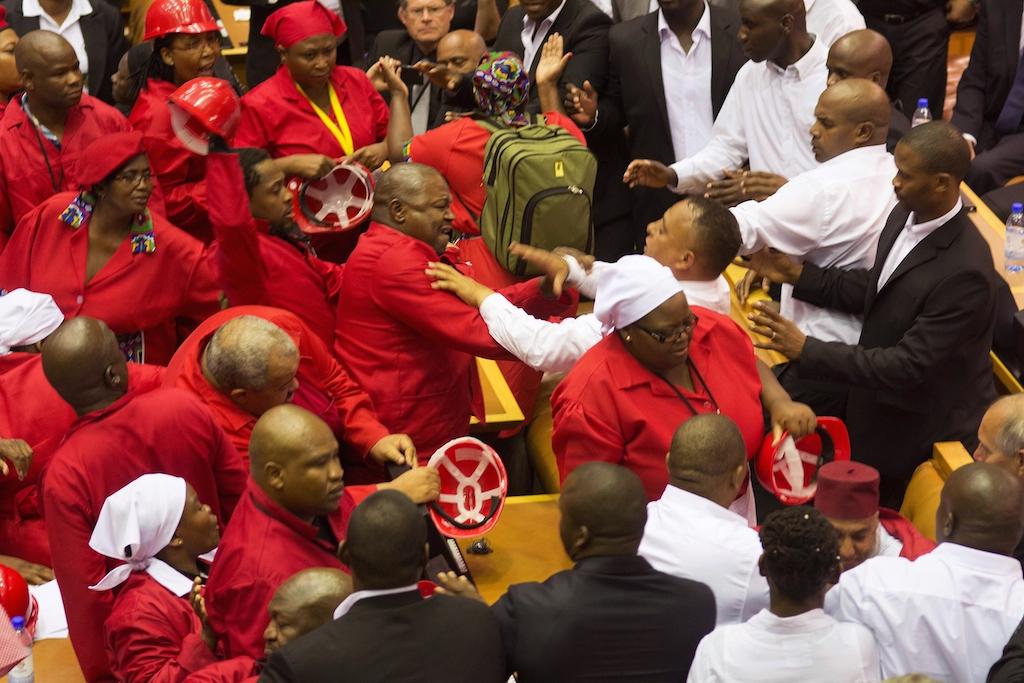Inside South Africa’s parliament on a night of fistfights and chaos
Members of the Economic Freedom Fighters, wearing red uniforms, clash with security forces during South African President’s State of the Nation address in Cape Town on February 12, 2015.
CAPE TOWN, South Africa — The biggest night for South Africa’s parliament began with a glamorous red carpet and ended in fisticuffs: scuffles, torn clothes and overturned desks in the heart of the nation’s democracy.
But the shocking scenes of members of parliament being dragged out of the chamber by security forces weren’t broadcast to South Africans who had tuned in to watch President Jacob Zuma deliver his State of the Nation address.
The cameras turned away as MPs from the leftist Economic Freedom Fighters party brawled with dozens of plainclothes men sent in to remove them. Earlier, cell phone signals were mysteriously jammed, apparently to prevent live tweeting of the proceedings. Journalists and MPs protested, declaring the jamming “sinister” and “unconstitutional.” The signal suddenly returned.
A showdown had been expected. For months the EFF has been hammering on the issue of Nkandla, a byword for the more than $20 million in public money spent on upgrades to Zuma’s private residence in rural KwaZulu-Natal.
The EFF, led by its outspoken “commander in chief” Julius Malema — former leader of the ruling African National Congress’ Youth League, who was expelled from the party — had pledged to disrupt Zuma’s speech over the issue.
In August, the last time Zuma was in parliament, EFF members shouted down the president with chants of, “Pay back the money!” In November, riot police clashed with opposition MPs over the issue.
But the events Thursday took a nastier turn, on what is traditionally Zuma’s big day, and may prove to be a watershed moment for South Africa’s young democracy.
A video posted by Erin Conway-Smith (@erinconwaysmith) on
A test for democracy
Since the death of apartheid, South Africa has been one of the freest countries on the continent. But there have been concerns lately of a slide toward increasing abuses of power.
The ANC-led government has passed a secrecy bill allowing for greater control of state information. Police brutality, like the 2012 killing of 34 protesters at the Marikana platinum mine, has increased, as has the government's interference in prosecutions including corruption cases.
The ejection of the MPs is also a sign of the growing unruliness in parliament — part of an increasing willingness by South Africans to defy the authorities and the traditional rules of the game. This mood is reflected in the rise of the EFF and their popularity particularly among young, unemployed voters.
A ritual in modern day South African politics is the Oscars-style red carpet parade as dressed-up MPs arrive at parliament, located in the center of Cape Town. Their outfits are typically over the top and sometimes garish, leading to “best dressed, worst dressed” lists in the newspapers the next day.
This year the Democratic Alliance, the main opposition party, wore funeral black to represent these being dark days for the country — a reference to ongoing rolling power blackouts.
'An insult to South Africans'
As Zuma began his speech, EFF members rose in succession asking questions on points of order, all on a theme: “When will Jacob Zuma pay back the money? When is the money being paid — by EFT [bank transfer], cash or eWallet?”
Baleka Mbete, the speaker, dealt with them patiently at first before calling in the guards. Opposition leaders have maintained that armed police were among the security officers who rushed in to remove EFF members.
Outside parliament, Malema addressed media with his shirt torn, accusing the ANC of turning South Africa into a “police state.” The EFF said that seven MPs were hurt in the scuffles. One female MP was taken to the hospital with facial injuries.
“It’s a sad day that elected representatives can be beaten by police,” Malema said.
Jeff Radebe, an ANC cabinet minister, said the government was “deeply disappointed and disgusted at the despicable conduct of some elected public representatives.”
The DA’s parliamentary leader said his party walked out of parliament in protest of armed police entering the chambers to remove the EFF.
“The ANC’s heavy handed use of police and the EFF’s theatrics does not advance the interests of South Africans or the accountability of those in power,” Mmusi Maimane said.
“Tonight’s sitting was nothing short of a disaster, and an insult to South Africans.”
Every day, reporters and producers at The World are hard at work bringing you human-centered news from across the globe. But we can’t do it without you. We need your support to ensure we can continue this work for another year.
Make a gift today, and you’ll help us unlock a matching gift of $67,000!
